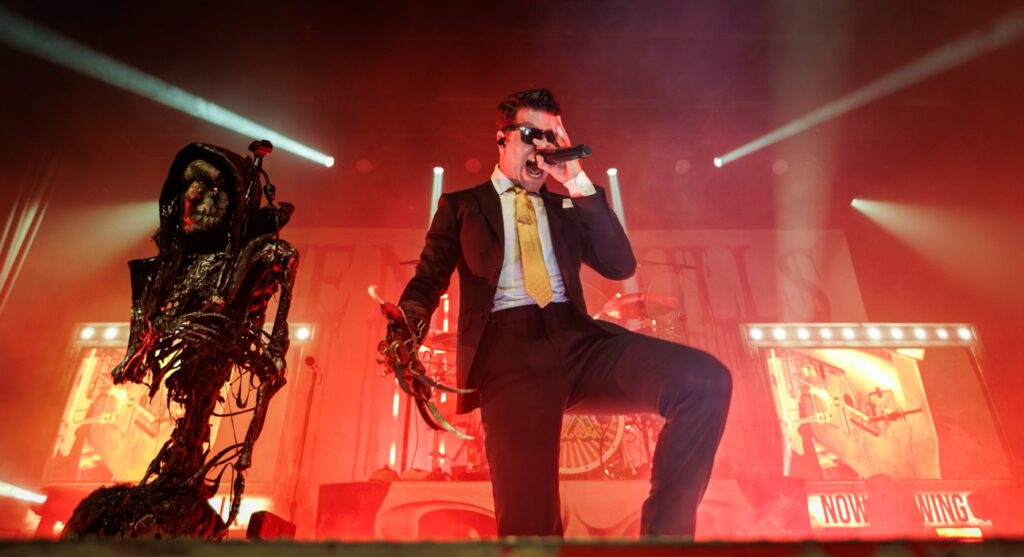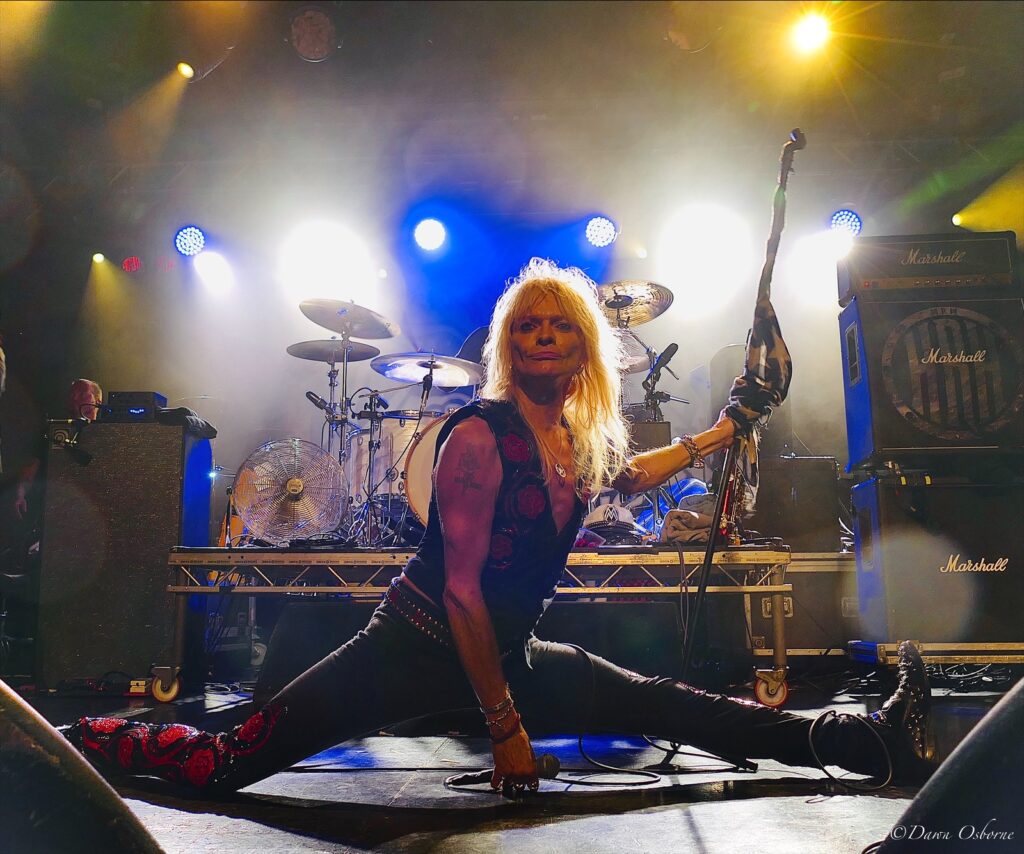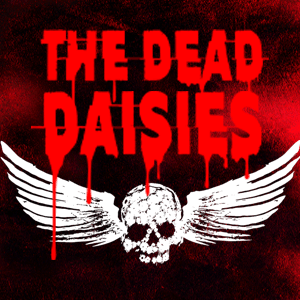ArcTanGent Friday – 2022 Review
Written by Jason Hough on September 18, 2022
At the crack of Friday morning, the festival fatigue begins its course after a few hours at last night’s silent disco. This reviewer remained awake until 2am because of a crowdfunding initiative for this year’s festivities. That initiative involved a dedicated headphone channel playing several albums in full across the night. The choices for that night made by those crowdfunding backers, were Blakfish’s Champions, Karnivool’s Sound Awake, and Queens Of The Stone Age’s Songs For The Deaf, and the deluxe edition at that. After reliving both of the latter albums, I walk back through a cold, wet mist and greet my sleeping bag, for a few hours slumber. No sooner does my head hit the sack, I’m woken by the remainder of the summer sun, battling bravely against persistent cloud cover. Eating and prepping once more, I embark back to the arena for ArcTanGent Friday, and what escapades await on easily the festival’s most eclectic day.
Watching Last Hyena serves as a perfect pick-me-up, not only because they are hyper sharp, and rambunctious first thing in the morning, but their cheeky, math-infused post-rock, is an utter delight. Their modus operandi is primarily based in instrumental heaviness, though there is the occasional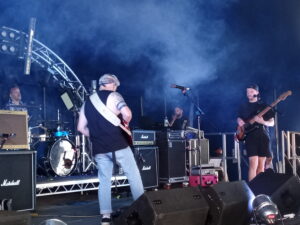 bellow into the crowd too. The rate they shift gears, feels like moving from action movie setpiece to setpiece. Their stage presence even feels choreographed by a kung fu master. Last Hyena are progressive, technical, and tussle with riffs like bar room brawls. For all of the bravado and gung-ho sensibility, periods of quiet do waltz along and calm proceedings temporarily, so they still do abide by the archetype. Well, at least for a couple of minutes. Whether they are self-stylised bad boys of post-rock or not, the display of machismo makes for entertaining viewing. Their final breakdown they do milk perhaps a little too hard, but they’re rewarded with a moshpit from the still stirring Friday crowd, and many smiles on faces.
bellow into the crowd too. The rate they shift gears, feels like moving from action movie setpiece to setpiece. Their stage presence even feels choreographed by a kung fu master. Last Hyena are progressive, technical, and tussle with riffs like bar room brawls. For all of the bravado and gung-ho sensibility, periods of quiet do waltz along and calm proceedings temporarily, so they still do abide by the archetype. Well, at least for a couple of minutes. Whether they are self-stylised bad boys of post-rock or not, the display of machismo makes for entertaining viewing. Their final breakdown they do milk perhaps a little too hard, but they’re rewarded with a moshpit from the still stirring Friday crowd, and many smiles on faces.
At the time of writing, and as the only group to not (yet) have released any material on the entire line-up, experimental noise duo Ni Maîtres are next up to see. And they certainly are experimental. Save a sub-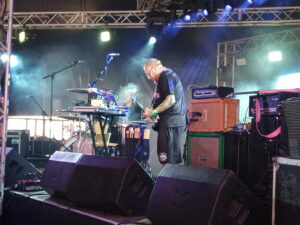 minute clip on social media, and a couple of gigs here and there, what the pair quite do remained to be seen widescale. Armed with a particularly elaborate if slightly ramshackle set-up, they blend organic basslines and rhythms, with throbbing, atonal analogue synths, and alter it over time. Japanese instrumental powerhouse Nisennenmondai are the closest thing to seeing an act like them before, I can recall. Continually looping uncomfortably distorted bass guitar, with a pumping drum beat, that is tweaked every so often, and sporadically rattled by jagged keys. It feels so raw, primal almost, for how bludgeoning it is. It isn’t tempo-locked either, which does make it more progressive in some cases too. The music just escalates and escalates and escalates, but never releases. This sonic creation feels much like mass hypnosis conducted by Neanderthals; relentless, bestial, but totally entrancing. That being said, this feels very much like a live experience. Even then, not one that everybody will understand. Bands like Ni Maîtres are an elusive breed nowadays.
minute clip on social media, and a couple of gigs here and there, what the pair quite do remained to be seen widescale. Armed with a particularly elaborate if slightly ramshackle set-up, they blend organic basslines and rhythms, with throbbing, atonal analogue synths, and alter it over time. Japanese instrumental powerhouse Nisennenmondai are the closest thing to seeing an act like them before, I can recall. Continually looping uncomfortably distorted bass guitar, with a pumping drum beat, that is tweaked every so often, and sporadically rattled by jagged keys. It feels so raw, primal almost, for how bludgeoning it is. It isn’t tempo-locked either, which does make it more progressive in some cases too. The music just escalates and escalates and escalates, but never releases. This sonic creation feels much like mass hypnosis conducted by Neanderthals; relentless, bestial, but totally entrancing. That being said, this feels very much like a live experience. Even then, not one that everybody will understand. Bands like Ni Maîtres are an elusive breed nowadays.
Over to Yokhai for the first time of the day, for an eye-opening encounter with Brazilian trio Odradek, whom upon approaching the tent, are already firing on all cylinders. Much like the amorphous, ostracized being in Kafka’s novel, Odradek have a concrete math rock foundation that destabilises into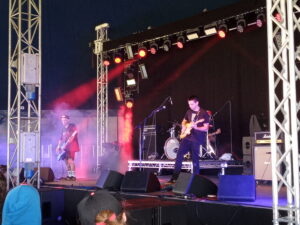 energising, elasticised, technical showmanship, and burly, hard-hitting riffs. It’s worth mentioning that the weight of these riffs are amongst the most impactful of its kind, without bordering into metal territory. This three-piece have so much vigour, they could be mistaken for a punk, or even a hardcore band with how much unbridled passion and aggression is put into their playing. A math rock group has never sounded this explosive in the space of just 35 minutes. This may be the very first time, eight years into their existence, they’ve performed out of their native continent, and no doubt they left an emphatic impression on those watching. This was a very special, humbling moment for them, and special for those who chose to be there.
energising, elasticised, technical showmanship, and burly, hard-hitting riffs. It’s worth mentioning that the weight of these riffs are amongst the most impactful of its kind, without bordering into metal territory. This three-piece have so much vigour, they could be mistaken for a punk, or even a hardcore band with how much unbridled passion and aggression is put into their playing. A math rock group has never sounded this explosive in the space of just 35 minutes. This may be the very first time, eight years into their existence, they’ve performed out of their native continent, and no doubt they left an emphatic impression on those watching. This was a very special, humbling moment for them, and special for those who chose to be there.
For today’s first Main Stage visit, there’s immediately zero presumptions that Danish blackgaze titans Møl are here to mess around. Returning to British shores for the first time since 2019, and to a gigantic lunchtime crowd, they waste little time flattening onlookers with their volatile metallic barrage. Frighteningly ferocious, with Kim Sternkopf’s tortured, piercing shrieks, tearing through unrelenting blastbeats and swirling, smouldering atmospheres. 2021’s Diorama is perhaps a more pensive overall listen than its 2018 counterpart Jord, but the emphasis on sustain and release within their music remains Møl’s heartbeat. Even at their most emotive, they retain every inch of their visceral edge. Vehement is but a word to capture the intensity of that display, in that very moment. It comes across in their interactions too, with Kim making his way into the crowd, not once, but twice, to emphasise the importance of community in alternative music. The second of these occasions, is in the middle of a whirling maelstrom of humanity, and that feels a fitting metaphor for what the five-piece create. At their most mournful, and at their most urgent, ineradicable spirit thunders through the very core of their music, and at one in the afternoon, it is awe-inspiring.
Directly over from the main stage, El Moono’s brand of genre-bending, anxious millennial hardcore is in full swing. The buzz surrounding the Brighton quartet has been skyrocketing of late on this latest touring circuit, with many press luminaries taking notice. On arguably the biggest stage so far of their short 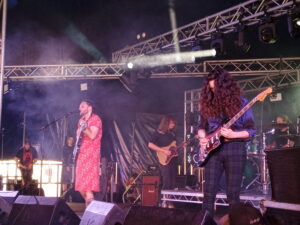 career though, they absolutely fulfil the hype and then some. Dressed as if Hawkwind were channelling Nirvana, with vocalist Zac Jackson looking especially fetching in his red summer dress, grunge and glimpses of psychedelic rock are just two components of a multi-faceted attack they blast the near-full Bixler crowd with. Progressive, math, and hard rock fly off the handle, with elements of post-rock, doom, metal and the aforementioned hardcore leanings all coming into play too. Vocal versatility plays fantastically into their sound, with stomach-tearing growls and shrill falsettos, spaced between pained screams, and shaken inflections. It clearly resonates with the audience, as El Moono slam their cathartic tales of struggle and mental health into them, the audience slams back, opening up a sizeable pit in appreciation. The stage barely contains the band’s energy too, with Zac going climbing on the front scaffold on more than one occasion, overseeing the mass of bodies colliding below. As unflinching, and uncompromisingly creative as you could hope to see from a young band, El Moono provide more pleasure in half an hour than some musicians manage in a lifetime.
career though, they absolutely fulfil the hype and then some. Dressed as if Hawkwind were channelling Nirvana, with vocalist Zac Jackson looking especially fetching in his red summer dress, grunge and glimpses of psychedelic rock are just two components of a multi-faceted attack they blast the near-full Bixler crowd with. Progressive, math, and hard rock fly off the handle, with elements of post-rock, doom, metal and the aforementioned hardcore leanings all coming into play too. Vocal versatility plays fantastically into their sound, with stomach-tearing growls and shrill falsettos, spaced between pained screams, and shaken inflections. It clearly resonates with the audience, as El Moono slam their cathartic tales of struggle and mental health into them, the audience slams back, opening up a sizeable pit in appreciation. The stage barely contains the band’s energy too, with Zac going climbing on the front scaffold on more than one occasion, overseeing the mass of bodies colliding below. As unflinching, and uncompromisingly creative as you could hope to see from a young band, El Moono provide more pleasure in half an hour than some musicians manage in a lifetime.
Back over the other side of the site, hotly tipped sludge duo Tuskar head up the PX3 stage’s next visit. Though when they start, their sound seems lighter, far less intimidating than what has been circulated recently. The thick swells of Torche-esque distorted blows, even in some of their heavier moments, feel… paired down. Whether that’s a tech issue, or they chose to open more introspectively, is negligible once the first few songs conclude. The pair are technically gifted musicians, though there’s a definite anger apparent in their performance. That being said, those calmer moments bear an unexpected emotional heaviness for a Friday afternoon, almost lamentations, if you will. Their progressive sensibility is incredible, not just song by song, but from beginning to end of their time on stage. It feels like a collective sharing of a burden, that personal weight transcending into pummelling passages, that loosens those metaphorical shackles if just for a small moment. Especially by the time Grave kicks in, their particular brand of sludge-soaked grooves akin to a cavalcade of furious buffalo, and only escalating from there. Starting slow is never an issue, but just how Tuskar grew and unravelled in their allotted time is a wildly uncommon experience nowadays.
To level with you, returning to the Bixler stage to see Cork’s God Alone, their performance was so magnetic, so frankly batshit, that it never occurred to write more notes down for it. It, however, feels a fitting notion and testament to the tour-de-force across 35 minutes, that you just couldn’t keep your eyes off of them. Musically, they straddle the line between math rock bops and jigs, and post-hardcore semantics. On forthcoming album ETC it has to be said, there’s now the sparkle and shimmer of blocky synth beats alongside the mayhem those two genres provide. From the outset, they proclaim they are here to dance, and hope you are too. Not that you could ever hope to keep up. The hyperactive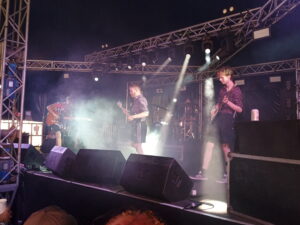 convulsions, like watching a whirlpool fight a tornado, from the lead guitarist and bassist, inside their bright, melodious, often syncopated rhythms, was deliriously entertaining. Imagine Foals never moved beyond their Antidotes-era, and experienced a bad acid trip that lasted their entire career, and it might get close to touching what God Alone are accomplishing. You can argue that they don’t truly have lyrics, more slogan-shouting into microphones, much like popular dance music really. But when they segue Danzel’s Pump It Up, LCD Soundsystem’s Daft Punk Is Playing At My House, and Scooter’s Hyper Hyper over their own songs, it leaves this reviewer rolling. Whether making a troupe of a thousand plus gyrate where they stand, or headbang violently in solidarity, God Alone are a band clearly having the time of their lives, and there may simply not be as utterly joyous a band the rest of this festival.
convulsions, like watching a whirlpool fight a tornado, from the lead guitarist and bassist, inside their bright, melodious, often syncopated rhythms, was deliriously entertaining. Imagine Foals never moved beyond their Antidotes-era, and experienced a bad acid trip that lasted their entire career, and it might get close to touching what God Alone are accomplishing. You can argue that they don’t truly have lyrics, more slogan-shouting into microphones, much like popular dance music really. But when they segue Danzel’s Pump It Up, LCD Soundsystem’s Daft Punk Is Playing At My House, and Scooter’s Hyper Hyper over their own songs, it leaves this reviewer rolling. Whether making a troupe of a thousand plus gyrate where they stand, or headbang violently in solidarity, God Alone are a band clearly having the time of their lives, and there may simply not be as utterly joyous a band the rest of this festival.
Seeing Blanket afterwards, is a perfect remedy from the previous pandemonium. Their forward-thinking blend of shoegaze and post-metal, develops into a worthy contender to succeed the mighty Deftones, when the Californian quartet write their final chapter. There’s a definite shine of Karnivool in their stride too. As such, the poise of their music more wanders and meanders, than rushes and tramples. The slower, contemplative atmospheres feel right at home as early evening approaches too. They are a dynamically really interesting listen, as their periods of heaviness aren’t crushing or drowned in distortion, but solemn, immersive, and echo through the universe. Not all heaviness has to rely on density, and Blanket demonstrate that it can be simple, and beautiful. Almost entirely clean vocals float throughout their sensual tide of demolition, with the harsh screams of blackened synthwave producer extraordinaire Gost lingering, through their exploratory wonder Romance. It works tremendously well though in this case. Their 40 minute set absolutely vanishes in such a nuanced, realised serenity in metal. Gorgeously cinematic, but with grit and bite when called upon, Blanket truly do create modern escapism en masse.
A personal admission of this review, is that the lore surrounding Zetra, the Zetra Corps. and the action/interactions going on during their performance, is completely unknown to me. It resembles some kind of brainwashing programme, where the multiple synced TV screens and infomercial footage are concerned at least. With synths and stands tied in chains, and curiously, suspended polystyrene rocks, there is and wouldn’t be a more idiosyncratic stage presence the entire weekend. If Zetra’s show wasn’t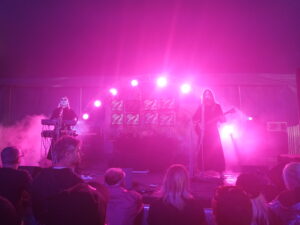 all the more compelling already. Sonically resembling the second coming of Type O Negative, the duo coolly fire luscious, atmospheric goth rock into the crowd, certainly with the same distorted, bulky guitar tone as the late, great Peter Steele. They even fulfil the goth archetype perfectly, being sans drummer, and all programmed by machine. Yet where the Drab Four excelled at brooding funeral dirges, with a healthy side order of dark humour, Zetra’s tracks feel more awash with optimism and hope than their predecessors. Hypnotising from beginning to end, they play with deliberate staggered pace that becomes engrossing. The nostalgic, vibrant synths cutting through impactful, crunchy guitar notes, with choral pads and bright ambience gradually shrouding the lighter vocal echoes, is scarcely heard outside the 80’s anymore. A live drummer could’ve elevated their show even more, but given the defiant lo-fi, old school nature of the project, the absence of one is supposed to be the point. A brilliant throwback, but one that felt wholly inspired and original, Zetra are destined for greater things.
all the more compelling already. Sonically resembling the second coming of Type O Negative, the duo coolly fire luscious, atmospheric goth rock into the crowd, certainly with the same distorted, bulky guitar tone as the late, great Peter Steele. They even fulfil the goth archetype perfectly, being sans drummer, and all programmed by machine. Yet where the Drab Four excelled at brooding funeral dirges, with a healthy side order of dark humour, Zetra’s tracks feel more awash with optimism and hope than their predecessors. Hypnotising from beginning to end, they play with deliberate staggered pace that becomes engrossing. The nostalgic, vibrant synths cutting through impactful, crunchy guitar notes, with choral pads and bright ambience gradually shrouding the lighter vocal echoes, is scarcely heard outside the 80’s anymore. A live drummer could’ve elevated their show even more, but given the defiant lo-fi, old school nature of the project, the absence of one is supposed to be the point. A brilliant throwback, but one that felt wholly inspired and original, Zetra are destined for greater things.
Heading back over to the PX3 stage, the two decade-long reinvention of Årabrot from avant-garde noise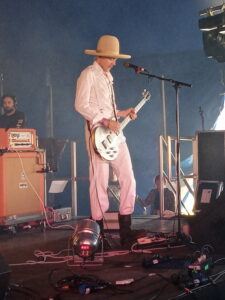 oddity, to swaggering rock visionaries, is one of the most encapsulating stories in the genre today. While their self-proclaimed dirty, ugly rock ‘n’ roll may not be as pristine as their all-white attires, it is performed impeccably, stemming from all of their releases over the last six years. The husband and wife duo of Kjeitil Nernes and Karin Park are ever the entertainers, the clergy of their Norwegian gothic owing as much to Bo Diddley as Queens Of The Stone Age. Kjetil especially has his best preaching persona on, with a very spirited rendition of Sinnerman towards the set’s climax. If church was anything like Årabrot’s prose, the concept of organised religion would be far more favourable. Having their light bars on stage, in the shape of the cross certainly reinforces that belief too. They may not be the most technical, the most atmospheric, or the most brutal of bands playing the entire weekend, but they certainly are amongst the best songwriters of the festival. This crowd are massively pleased during their 45 minute tenure. The literal marriage of Karin’s otherworldly voice and majestic keys, with Kjetil’s wavering cries and fuzzed-out guitar, is such an accomplished, addictive combination, it’s no wonder their art is met with such adoration. The days of Årabrot being a cult sensation are surely numbered by now.
oddity, to swaggering rock visionaries, is one of the most encapsulating stories in the genre today. While their self-proclaimed dirty, ugly rock ‘n’ roll may not be as pristine as their all-white attires, it is performed impeccably, stemming from all of their releases over the last six years. The husband and wife duo of Kjeitil Nernes and Karin Park are ever the entertainers, the clergy of their Norwegian gothic owing as much to Bo Diddley as Queens Of The Stone Age. Kjetil especially has his best preaching persona on, with a very spirited rendition of Sinnerman towards the set’s climax. If church was anything like Årabrot’s prose, the concept of organised religion would be far more favourable. Having their light bars on stage, in the shape of the cross certainly reinforces that belief too. They may not be the most technical, the most atmospheric, or the most brutal of bands playing the entire weekend, but they certainly are amongst the best songwriters of the festival. This crowd are massively pleased during their 45 minute tenure. The literal marriage of Karin’s otherworldly voice and majestic keys, with Kjetil’s wavering cries and fuzzed-out guitar, is such an accomplished, addictive combination, it’s no wonder their art is met with such adoration. The days of Årabrot being a cult sensation are surely numbered by now.
In some eyes, one of the worst clashes of the festival between Jamie Lenman and Rivers of Nihil, leads to completely full tents on both sides of the festival. Every Jamie Lenman appearance warrants surprises aplenty, just because of how eclectic and spontaneous his performances can be. However, they are slightly more common than Rivers of Nihil’s journeys across the pond, and the overflowing Bixler stage is where I head for the death metal juggernauts’ onslaught. Cutthroat, laser-focused, and hitting with the force of a thousand suns, the Pennsylvanian four-piece play an incendiary show, revolving around their recent seminal releases. The beauty of their technical, progressive assault is not just their ferocity, but that they dare to tread into unexplored waters beyond a mostly played out genre. Not that they sacrifice any viciousness in their attack. The dissonant melodies of saxophone, managing at least one solo throughout their performance, compliment the devastating buzzsaw of the guitar. While samples aren’t uncommon in death metal, tracks from their latest opus The Work, feature mechanical splinters and industrial rhythms, which rarely are the two subcultures spliced together nowadays. No matter how devastating their arsenal is, Rivers of Nihil are among the most creative in their field, and a bonafide premiere band of its ilk. The crowd rightfully goes ballistic for the duration of their set, and may just be one of the best of the whole festival.
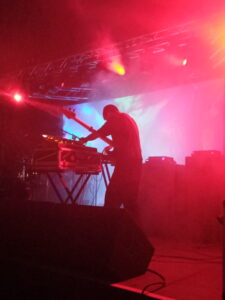 The electronic factions within ArcTanGent have had smaller platforms and showcases here and there, Perturbator excluded. None are more so as late in the evening as Scalping, who have the cruellest of clashes with Zeal & Ardor, and Japanese shoegaze trio Paranoid Void. For those that have never experienced the Bristol quartet in action, they experiment with the big beat and acid techno phenomenon of the 90s, and transform it into a live band environment. The very nature of faithfully recreating that craft, has a gigantic stage setup. You’ve never seen a stage crowded with gear, instruments, and bodies before they even begin. Which makes it the even more impressive they hauled it all over the Welsh border just a few hours later for a second festival performance. Nonetheless, every inch of that equipment becomes paramount in delivering one of the most jaw-dropping performances, if not the most, of the whole weekend. With atmospheres and beats that conjure The Crystal Method and The Chemical Brothers, though with metal still pulsing through their veins, Scalping bring to life a dystopian psychedelic nightclub. Swampy electronics and pounding bass all fluidly transition through a continuous trip, that had as many been alive, could be what the fabled warehouse raves of yonder might’ve felt like. That aggressive penchant in their influences gets scratched by abrasive guitar snarls, and synths that carve and cleave through your eardrums. Squirming, writhing projections of bodies, worms, tentacles, micro-organisms, backdrop Alex Hill’s manic, meticulous compositions, momentarily dragging the Bixler stage into some kind of icy, euphoric abyss. Bands like Scalping are one in a generational, and the kind of unreal talent that simply cannot be understated. Fans of darker, heavier electronic-based music, HAVE to see this band.
The electronic factions within ArcTanGent have had smaller platforms and showcases here and there, Perturbator excluded. None are more so as late in the evening as Scalping, who have the cruellest of clashes with Zeal & Ardor, and Japanese shoegaze trio Paranoid Void. For those that have never experienced the Bristol quartet in action, they experiment with the big beat and acid techno phenomenon of the 90s, and transform it into a live band environment. The very nature of faithfully recreating that craft, has a gigantic stage setup. You’ve never seen a stage crowded with gear, instruments, and bodies before they even begin. Which makes it the even more impressive they hauled it all over the Welsh border just a few hours later for a second festival performance. Nonetheless, every inch of that equipment becomes paramount in delivering one of the most jaw-dropping performances, if not the most, of the whole weekend. With atmospheres and beats that conjure The Crystal Method and The Chemical Brothers, though with metal still pulsing through their veins, Scalping bring to life a dystopian psychedelic nightclub. Swampy electronics and pounding bass all fluidly transition through a continuous trip, that had as many been alive, could be what the fabled warehouse raves of yonder might’ve felt like. That aggressive penchant in their influences gets scratched by abrasive guitar snarls, and synths that carve and cleave through your eardrums. Squirming, writhing projections of bodies, worms, tentacles, micro-organisms, backdrop Alex Hill’s manic, meticulous compositions, momentarily dragging the Bixler stage into some kind of icy, euphoric abyss. Bands like Scalping are one in a generational, and the kind of unreal talent that simply cannot be understated. Fans of darker, heavier electronic-based music, HAVE to see this band.
In one of their only major festival headline appearances in their 15-year strong career roaming the earth,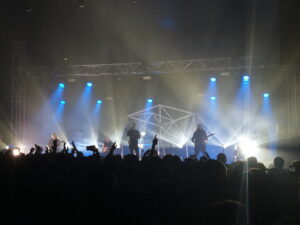 Tesseract take to it like battle-hardened heroes at homecoming. Having spent a significant amount of that time, supporting just about every massive name in progressive and heavy territories of metal, this feels a massive crowning moment for the homegrown heavyweights. It’s deserved, and this main stage audience are amped up for their brand of precise, muscular tech-metal. Just as well, they hit hard and fast with their grooves, almost endlessly. Opening with their Of Mind suite from Altered State, the fast-fingered, progressive melodies get a sea of bodies moving early on. The greater emphasis on emotion and ambience as an introduction serves them well, giving the ever-charismatic Dan Tompkins room to stretch his vocal range wondrously. The brief detour into Sonder’s King and Beneath My Skin descends into further atmospheric territory, before exploding into heavy polyrhythmic bounces, and back into the labyrinthine Of Energy suite. There are several sing-along moments too, and this crowd is incredibly loud tonight. Unsurprisingly, they are an unbelievably tight musical unit. Though as enthralling as it is watching masters at work, the first half of their setlist certainly blurs into one another. Perhaps the mellower start was always intentional. As soon as they rip into parts one, two, and three of Concealing Fate however, this crowd becomes unglued. Part two Deception in particular, with the array of scattered, sweeping lasers from the stage, is rapturous, between its titanic vocal hook and the staccato stampede of riffs. New track Natural Disaster also features the energy and weight of
Tesseract take to it like battle-hardened heroes at homecoming. Having spent a significant amount of that time, supporting just about every massive name in progressive and heavy territories of metal, this feels a massive crowning moment for the homegrown heavyweights. It’s deserved, and this main stage audience are amped up for their brand of precise, muscular tech-metal. Just as well, they hit hard and fast with their grooves, almost endlessly. Opening with their Of Mind suite from Altered State, the fast-fingered, progressive melodies get a sea of bodies moving early on. The greater emphasis on emotion and ambience as an introduction serves them well, giving the ever-charismatic Dan Tompkins room to stretch his vocal range wondrously. The brief detour into Sonder’s King and Beneath My Skin descends into further atmospheric territory, before exploding into heavy polyrhythmic bounces, and back into the labyrinthine Of Energy suite. There are several sing-along moments too, and this crowd is incredibly loud tonight. Unsurprisingly, they are an unbelievably tight musical unit. Though as enthralling as it is watching masters at work, the first half of their setlist certainly blurs into one another. Perhaps the mellower start was always intentional. As soon as they rip into parts one, two, and three of Concealing Fate however, this crowd becomes unglued. Part two Deception in particular, with the array of scattered, sweeping lasers from the stage, is rapturous, between its titanic vocal hook and the staccato stampede of riffs. New track Natural Disaster also features the energy and weight of 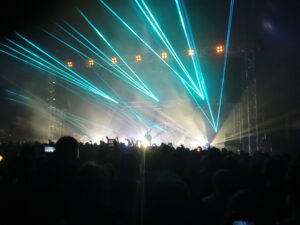 their older material, maybe suggesting a return back to their roots for their upcoming album. Yet before the one-two closing blows of Of Mind – Nocturne and Juno, it’s the moving, dynamic calm of Tourniquet, complete with phone or lighter illuminations across the entire tent, that summarises the passion and unity surrounding ArcTanGent. Music fans of all walks of life coming together to connect through the heavy, the evolutionary, and the out there. It’s truly a touching moment. Tesseract have grafted for over a decade to reach this summit, their sound stellar and befitting these monumental occasions, with the manner of showmanship to coincide with it. A spectacular set symbolic, not just for the legions in attendance, but for where the band are headed from here.
their older material, maybe suggesting a return back to their roots for their upcoming album. Yet before the one-two closing blows of Of Mind – Nocturne and Juno, it’s the moving, dynamic calm of Tourniquet, complete with phone or lighter illuminations across the entire tent, that summarises the passion and unity surrounding ArcTanGent. Music fans of all walks of life coming together to connect through the heavy, the evolutionary, and the out there. It’s truly a touching moment. Tesseract have grafted for over a decade to reach this summit, their sound stellar and befitting these monumental occasions, with the manner of showmanship to coincide with it. A spectacular set symbolic, not just for the legions in attendance, but for where the band are headed from here.






